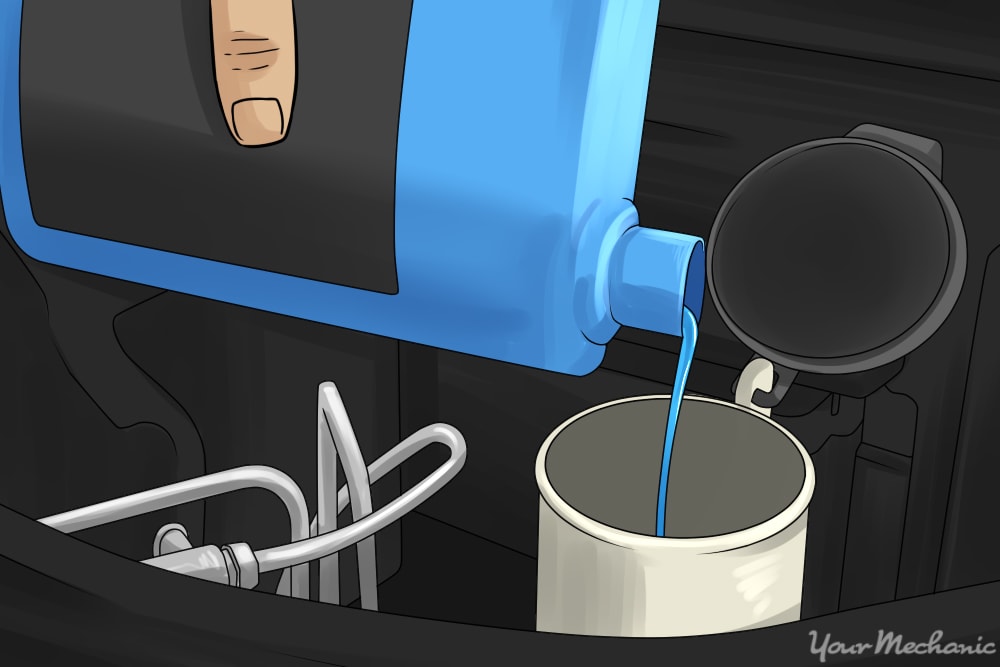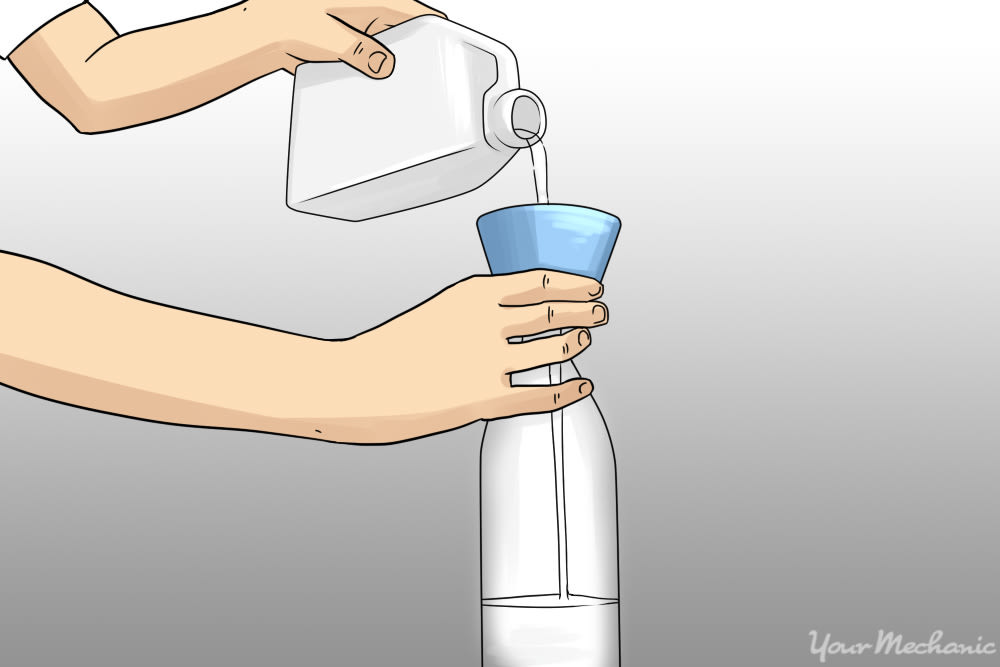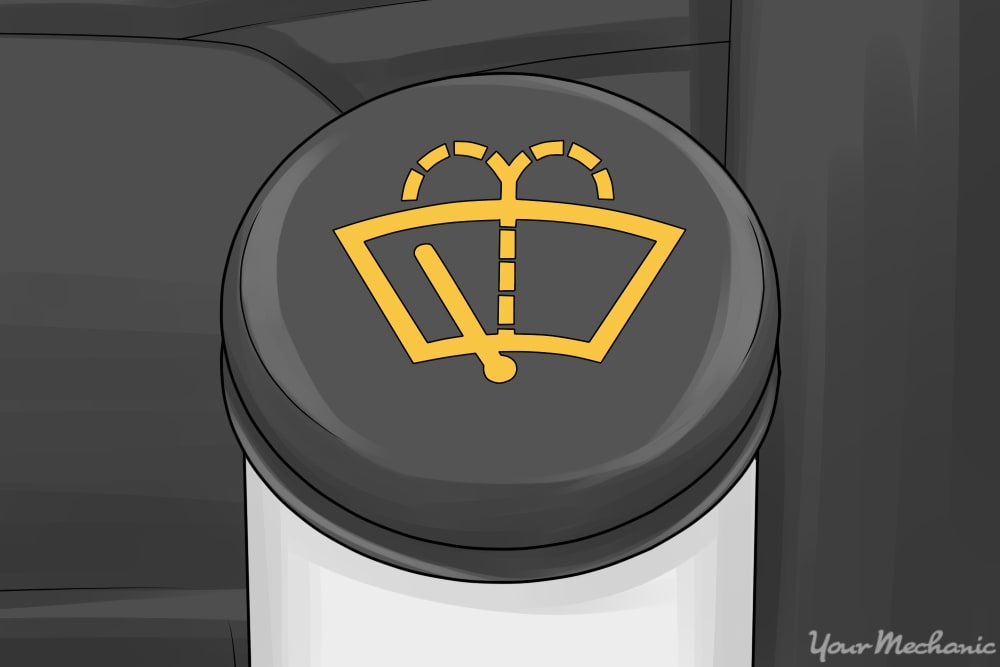

Many people choose to make their own windshield washer fluid at home because of safety concerns involving commercially made washer fluids. Most commercially sold types of windshield washer fluid contain methanol which is not only poisonous and potentially harmful to humans, but is also bad for the environment.
If you follow these steps, you can make your own safe and inexpensive washer fluid to use in both warm and cold weather.
- Note: Be aware of changing weather conditions and keep different fluids for different seasons on hand. When transitioning from a warm weather fluid to a cold weather one, be sure to drain all of the old fluid before introducing the new one.
If your warm weather fluid contains vinegar, be sure to flush your fluid reservoir and lines with clean water as vinegar and dish soap may clog your washer fluid lines.
Warning: When storing homemade washer fluid, you should be mindful of children and pets and keep it out of their reach. Also make sure to label your mixture and keep it away from children.
Note: Be sure to mix potentially noxious liquids like ammonia and rubbing alcohol in a place with good ventilation.
The rubbing alcohol, soap, and ammonia can be very harmful if ingested. As with any mixture, it is best to store your homemade washer fluid in a safe place with a consistent temperature. Storing washer fluid in your trunk or back seat may lead to spills which may damage your vehicle’s carpet or seats.
Method 1 of 5: Make a warm weather washer fluid mix
This mix is designed for use in mild temperatures and may need to be modified for use in colder weather.
Warning: This mixture is not recommended for extremely warm temperatures as warm/hot vinegar will produce a strong, unpleasant smell.
Tip: This mixture is amongst the most effective for places where pollen is a concern.
Materials Needed
- Distilled water
- Large jug
White vinegar
Tip: To both store and help measure out your windshield washer fluid, use large vessels like milk jugs or large soda bottles. Make sure to thoroughly clean the storage bottle before use as residue may reduce the effectiveness of homemade washer fluid.
Step 1: Take distilled water in a jug. In a large vessel, add distilled water until the vessel is about ¾ full.
For a gallon jug, this will mean 12 cups, and for a 2-liter bottle, just over 6 cups.
- Tip: Distilled water works much better than tap water, as deposits from tap water will eventually clog up your vehicle’s spray nozzle.
Step 2: Add white vinegar. Fill the rest of the vessel with white vinegar. Leave some space in the container to mix the water and vinegar.
- Tip: Be sure to use white vinegar only. Other types of vinegar may leave an unwanted residue.
Method 2 of 5: Make a hot weather washer fluid mix
This mixture is best for hotter temperatures as the window cleaner will not produce the same unpleasant smell as vinegar.
Materials Needed
- Distilled water
- Large jug or vessel
- Window cleaner
Step 1: Take distilled water. In a large vessel, add distilled water until the vessel is about ¾ full.
Step 2: Add window cleaner. Add 8 oz of a commercial window cleaner to the water and mix well.
- Tip: It’s best to use a window cleaner that doesn’t streak, as this may affect the clarity of your windshield.
Method 3 of 5: Make a cold weather washer fluid mix
People who live in areas with weather extremes may not be able to use the warm weather washer fluid all-year round. Both vinegar and window cleaner will freeze in extreme cold and may damage your vehicle’s hoses and nozzles.
Fortunately, warm weather mixes can be easily modified for cold weather conditions. The easiest way to modify your warm weather mixes for cold weather is to add alcohol. Because alcohol freezes at a much lower temperature than water, it can be more effective in cold weather.
While rubbing alcohol is recommended, high-proof vodka can also be substituted. Adding a cup of alcohol to warm weather washer fluid can keep your mixture from freezing.
Materials Needed
- Distilled water
- Large jug
- Rubbing alcohol or vodka
- White vinegar
Step 1: Take distilled water in a jug. In a large vessel, add distilled water until the vessel is about ¾ full.
Step 2: Add white vinegar. Fill the rest of the vessel with white vinegar. Leave some space in the container to mix the water and vinegar.
Step 3: Add rubbing alcohol. Add 1 cup of rubbing alcohol or vodka and mix well. Test the alcohol mix by placing outside overnight. If the mixture freezes, you may need to add more alcohol.
Method 4 of 5: Make an all-weather washer fluid mix with ammonia and dish soap
If you want a more universal windshield fluid, capable of being used in all weather, try the following steps to prepare a mix that won’t freeze and will still be effective in warm weather.
Materials Needed
- Ammonia
- Dish soap
- Distilled water
- Large jug
Step 1: Mix water and dish soap. In a large vessel, add one gallon of distilled water. Add a tablespoon of dish soap to the water and mix well.
Be sure to use a dish soap that doesn’t streak as it might affect the clarity of your windshield.
Step 2: Add ammonia. Add a ½ cup of ammonia to the mixture to help clean your windshield and prevent freezing.
- Note: While this mixture may not work in extreme cold, it should still be effective in cooler temperatures.
Method 5 of 5: Make an all-weather washer fluid mix with rubbing alcohol
In colder climates, washer fluid mixes with rubbing alcohol can also be effective de-icers. Using commercial washer fluid to de-ice can be expensive, making homemade mixes a more cost-effective choice.
Materials Needed
- Castile soap
- Distilled water
- Large jug
- Rubbing alcohol
Step 1: Mix water and rubbing alcohol. In a large vessel, take one gallon of distilled water. Add approximately 8 oz of rubbing alcohol to the water and mix well.
Step 2: Add castile soap. For this mixture, try using Castile soap as opposed to dish soap. Castile soap contains more natural ingredients and may be safer for your car’s paint.
- Tip: For colder temperatures, increase the amount of alcohol used to avoid freezing.
Before pouring the fluid into your car’s washer fluid reservoir, always test your homemade mix on your windshield to make sure it is effective. Dab a small amount of mix onto a clean cloth and rub it on your vehicle’s windshield. You can also use your homemade mix to clean the other side and rear windows of your vehicle.
Make sure you identify the washer fluid reservoir before attempting to fill the fluid. The fluid filler neck is typically located in the engine bay and is designated by either the words, “Washer Fluid Only,” or a windshield fluid symbol on the reservoir cap as shown above.
- Note: As with any do-it-yourself project, you should be aware of potential issues that may arise from introducing fluids that were not specifically designed for vehicles into your car. If you notice that the fluid is not spraying properly, or is causing streaks, discontinue use immediately.
If you notice that washer fluid is not flowing freely onto your windshield, you may have clogged washer fluid tubes. If you are experiencing issues, get a certified mechanic, such as one from Your Mechanic, to inspect your washer system and replace the tubes if needed.





